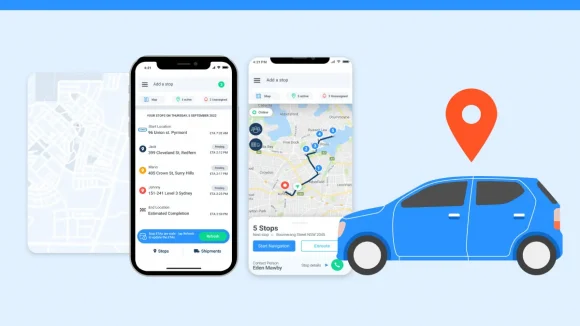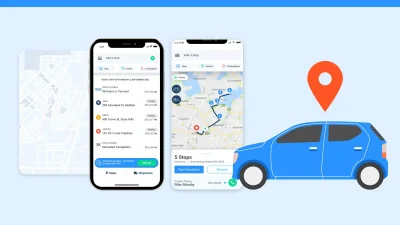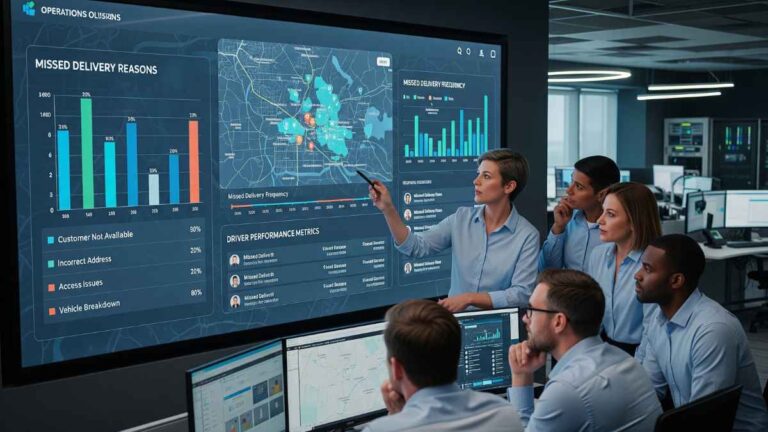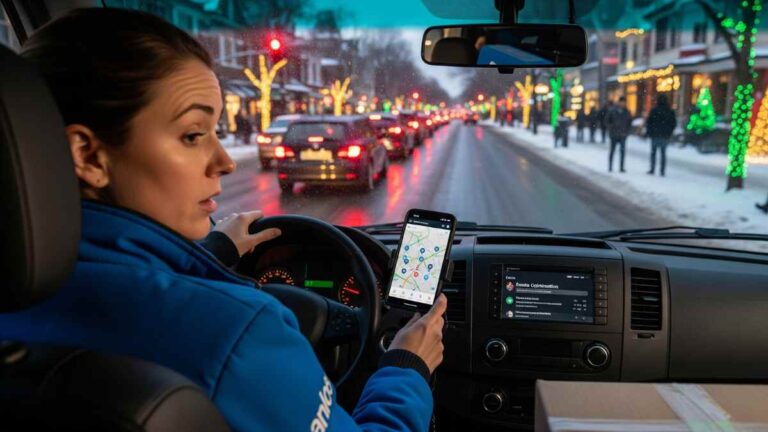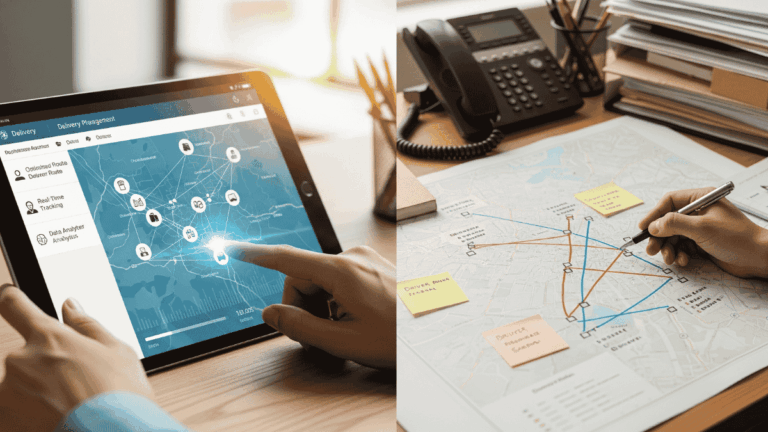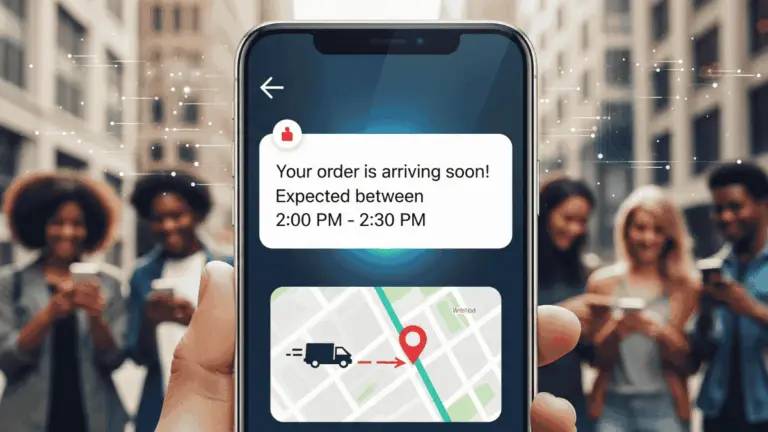Knowing the whereabouts of your team and vehicles throughout the day can help reassure you that jobs are being completed successfully and on time. GPS tracking is used to track the live location of your assets and vehicles.
This is exceedingly valuable for businesses wanting to enhance visibility of their fleet and accountability for your drivers.
What is GPS (Global Positioning System) tracking and how does it work?
What is GPS?
A Global Positioning System (GPS) is a navigation system that uses satellites, receivers and algorithms to contemporize location, land and sea travel, velocity and time data for air.
What are the elements of GPS?
Ground control segment
Earth-based monitor stations, master control stations and ground aerial all make up the control segment.
Control activities comprise of:
- Operating and monitoring satellites in space
- Tracking transmissions
Space (satellites) segment
The satellites surrounding the Earth transmit signals to users on the time of day and geographical location.
User component
Transmitters and GPS receivers such as:
- Watches
- Smartphones
- Telematic devices

Types of GPS tracking devices
Active GPS tracker
Active tracking is used for constant tracking of locations and relies more on storing information which can be accessed and used in the future.
Active GPS tracking works with satellite or cellular networks and can process and deliver data in real time, depending on regular connection.
Active GPS tracking is more suitable for machines and vehicles that are constantly being used.
Passive GPS tracker
Passive GPS trackers store GPS data at set intervals or triggers. These can include breaching a geofence or reaching a certain location.
Passive trackers record data that can be downloaded from the tracker and doesn’t need continuing network connection for data transmission, meaning it’s a lot cheaper than other types of GPS tracking systems.
However, one of the cons using this type of tracker is the inability to receive real-time updates, making it more suitable for non-powered assets and machines that don’t move as often. Another con is that passive trackers could disrupt your workflow.
Benefits of GPS tracking system
Increased security
Theft is an issue that drivers encounter and can instigate massive financial losses for businesses.
Vehicle tracking combats this problem by giving you full visibility of your fleet. If a vehicle goes missing, GPS tracking increases the chances of recovery and eliminates the requirement to purchase another vehicle.
Retrieving your vehicle also means you don’t have to waste time completing an insurance claim.
You can also detect if one of your employees has been using company vehicles for personal use.
Reduced fuel costs
Fuel costs are no doubt a huge expense for businesses with the amount of fuel consumed being dependent on the behaviour of your employees.
Excessive idling in traffic, speeding and other variations of dangerous driving can all be attributed to increased fuel expenses. Such waste of money and fuel can end up eating through profits.
GPS technology lets you identify exactly where your expenses are coming from so you can come up with solutions to combat this issue and increase your business’ profitability.
Reduced timesheet fraud
With GPS tracking you can determine the location of your drivers and the time they’ve entered and left a site.
This level of visibility means you no longer have to depend on manually filling out timesheets and slowing down your business’ efficiency.
You can see accurate start and finish times and see if they align with team member timesheets. In doing so, minimising the potential for timesheet fraud and ensuring drivers are paid for the hours they’ve actually worked.
Improve driver safety
GPS tracking allows you to monitor the behaviour of your drivers while on the road and see areas that need improvement to reduce future accidents.
If your team members are driving dangerously this could result in an accident and potentially harm themselves. Because your drivers represent your brand, it’s key that they follow road rules and drive safely.
GPS fleet tracking gives the visibility to monitor the behaviour of your entire fleet, allowing you to detect which driver needs additional training to make better use of company vehicles and assets.
Improved customer satisfaction
Being a business owner means your focus is always on improving the customer experience, and hopes for potential repeat purchases.
A 2021 Zoom2u study showed that 78.9% of customers would be disappointed if they missed a home delivery.
Not to worry! GPS trackers improve the accuracy of ETAs given to customers, so if they call up inquiring about their order you can access that information easily instead of chasing up drivers.

GPS tracking features
- Live tracking
- Driver tracking behaviour
- Geofences
- Route replay
Can a GPS work without a battery?
Yes! The OBD GPS tracker (plug-in tracker) and hardwired GPS can function without a battery. This is because a vehicle generates the electricity from the operating engine and vehicle battery to power the tracker without needing external sources of power.

Types of vehicle GPS trackers
OBD2 Port Device
The OBD2 port device is an affordable and compact tracker that is great for a flexible fleet.
This GPS tracker doesn’t require installation as it plugs directly into your vehicle, allowing you to swap between vehicles while keeping up to date with their whereabouts even out of mobile range.
The OBD2 tracker lets you know where your drivers are so you can verify their locations if a customer calls up with an inquiry.
Rugged GPS Hardwired Device
An ultra-rugged tracker is a device that is hardwired to your vehicle and can’t be removed or altered, minimising the potential for theft.
This hardwired tracker can keep track of vehicles even out of mobile range, as well as sharing your driver’s location in real time with the customer. That way they can anticipate when your driver will arrive.
Battery Powered Device
A battery powered GPS tracker eliminates the requirement for a powersource, allowing you to track bikes, pallets, shipping containers and much more!
The battery powered device’s main purpose is to decrease the potential for assets being stolen and left at the wrong worksite. Locate2u’s battery powered tracker has up to 7 years battery life for long-term theft recovery and asset tracking.
Track any freight or equipment you need with the assistance of two screws.
Cost of GPS device
GPS tracking devices pricing starts anywhere from $10 to $25 for a monthly subscription depending on the brand you decide to opt with.
Locate2u offers a range of reliable GPS fleet tracking devices to help monitor your drivers while on the road throughout the day.
Choose between the OBD2 port device, rugged GPS hardwired device or battered powered device.
How do you install a hardwired GPS tracker?
Installing a hardwired GPS tracker isn’t as easy as a plug-in portable device. Here are the following steps to help guide you through installing your hardwired GPS tracker.
- Turn your vehicle off to avoid electrical power flowing while you’re connecting the tracker.
- Take off the covers and panels of your vehicle’s lower dash and locate the wires to connect your device beneath the steering wheel.
- Find the constant power wire and ignition wire, which are connected to your vehicle’s ignition switch. Make sure you check the manufacturer’s vehicle wiring diagram to locate the appropriate wires. Connect your wires as the GPS tracker installation guide suggests.
- Position the device around or close to the ignition coil with the tracker facing upwards and the label downwards to get the best connection. Place the covers and panels of your vehicle’s lower dash using the appropriate tools.
- Take the vehicle for a test drive (5-10 minutes) so the device can initiate a GPS connection.
- Track and monitor your vehicle!
Problems that are solved with GPS tracking
Delayed knowledge of problems
Say you’ve finished up for the day and about to head home until you hear one of your vehicles have broken down. Surprisingly this occurred a few hours ago but you’ve only been notified now.
Now you have to decide what to do with the goods meant for shipment, get the vehicle serviced and alter driver schedules, ultimately incurring overtime costs.
GPS fleet tracking will send you alerts if a vehicle is experiencing issues at the exact time they happen no matter the location. This enables you to fix the problem as soon as possible and keep overtime costs at a minimum by organising driver schedules accordingly.
Excessive spending on parts and fuel
Fuel and replacement parts can eat up a lot of your budget, not to mention the amount of overtime you’ve paid your maintenance team members.
Managing these challenges by yourself can seem nearly impossible. That’s where GPS fleet tracking comes in. Tracking your vehicles allows you to monitor driver behaviour so you can see who is contributing most to fuel consumption and wear and tear.
Implementing GPS into your system will also deter drivers from taking inefficient routes to get to their destination because they know they’re being monitored.
Lack of security
Your vehicles and assets are exceedingly valuable to your business and expensive to replace should they be stolen or damaged.
Not having a GPS tracking system increases the likelihood of theft, keeping business owners and fleet managers constantly on edge. You shouldn’t have to wonder if your vehicles and equipment are safe.
GPS devices work to monitor any equipment or vehicles that enter or leave a site and trigger alerts involving an issue that occurs after hours.
Reporting is time consuming
No one wants to spend their valuable time managing copious amounts of paperwork. Monitoring receipts, fuel logs and mileage data is extremely time consuming.
A solution you might consider is hiring an additional team member to keep track of everything. However, you might not have the funds for this.
Having a fleet management system that offers reliable GPS tracking collects information pertaining to fuel usage and state mileage so you can keep on top of everything.
Maintaining organisation has never been easier!
Unaware of who is the best driver
If you’re wanting to enhance your fleet’s efficiency then identifying the best performing drivers are and who needs additional training is key. But how can this be achieved? You can’t just tag along for the ride unfortunately.
With the help of GPS tracking, you can detect your drivers habits and what needs to be improved on. The information collected by vehicle sensors enables you to identify the best performing drivers and those that need extra training.
Tracking driver behaviour reduces maintenance and fuel costs, minimises fleet liability and allows you to reward drivers who are safely abiding road laws.

Can GPS work without a SIM card?
GPS is a radio that receives location information from satellites, making it entirely separate from WiFi, Cellular or Bluetooth data connection. This means that a GPS tracker can work without a SIM card.
There is no need for internet connection when it comes to pre-loaded maps. Because the directions surrounding you are typically unchanged, it isn’t completely helpful to update them consistently.
Using the downloaded maps is a great solution if you can’t access the route information through the internet.
How does smartphone GPS work without the internet?
The GPS uses satellite signals and data processing algorithms to come up with accurate location data.
There are three main factors when it comes to the navigation system:
- GPS receivers
- Maps platform
- Navigation platform
An integrated GPS receiver is featured in your phone and can make out your location without cellular information.
You can store maps on your smartphone and because they don’t change much, there is no requirement for connectivity. This can be achieved by downloading (offline) maps.
Which GPS tracker is best?
Who uses GPS tracking?
- Electricians
- Retail stores
- Food trucks
- Plumbers
- Cleaning and laundry
- Trucking
- Pharmacy deliveries
Does a GPS tracker work when the car is off?
Yes! Your GPS tracker can work when the car is turned off. This is because GPS tracking devices possess their own built-in-power, allowing them to operate without needing to be connected.
The best portable GPS tracker
If you’re searching for the best portable GPS tracker for your vehicles then Locate2u’s OBD2 Port Device is the perfect solution for you.
The OBD2 Port Device is a compact and affordable device that has the ability to plug in directly into your vehicle, no need for installation! That way you can swap between vehicles while monitoring them, even when exceeding mobile range.
How long does the battery last in a GPS tracking device?
Locate2u’s battery powered GPS tracking device has up to 7 years battery life for extended asset tracking and theft recovery.
Because this device is battery powered, there is no need for a powersource, allowing you to track pallets, bikes, shipping containers etc easily!
The Most Reliable GPS Fleet Tracking Devices
If you’re wanting to enhance your fleet’s overall performance and cut down costs, then Locate2u is the perfect solution!
Locate2u is a delivery management software that offers a selection of GPS tracking devices that can help keep your vehicles and assets secure, improve the accuracy given to customers and cut down fuel and maintenance costs.
This software is suitable for any industry, whether you’re an electrician, plumber, cleaning service or in transport and logistics.
Click here to see Locate2u’s range of GPS fleet tracking devices or speak with the team and request a demo.

About the author
Marketing Coordinator at Locate2u having completed a Bachelor of Creative Arts, majoring in English Literature and Creative Writing. I have extensive experience in editing and proofreading, as well as creating content for a range of audiences.

